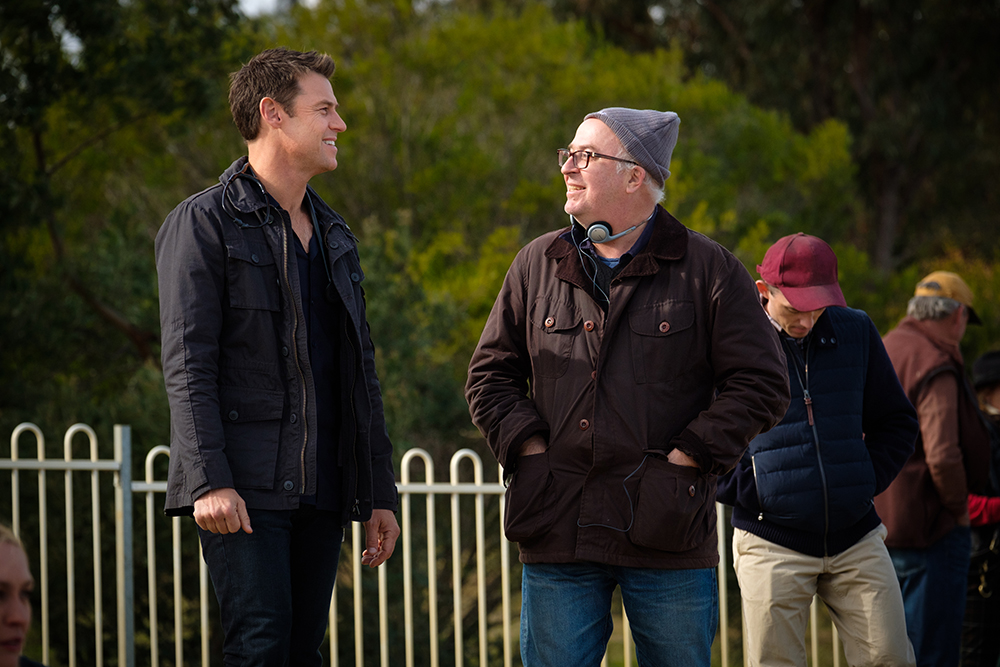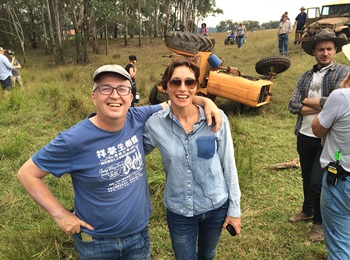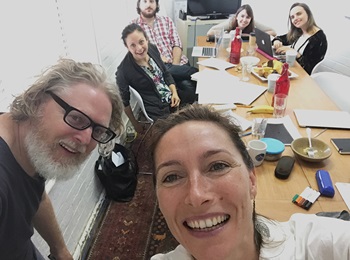Collie, Karvan and McNamara on the evolution of TV
Doctor Doctor producers Ian Collie, Claudia Karvan and Tony McNamara weigh in on season 2, the evolution of the TV industry and nurturing new voices.
Doctor Doctor producer Ian Collie says TV drama is in “great shape”, but along with the increasing demand overseas for Australian talent and content, there comes a responsibility to ensure that pool is being replenished back home.
Actually it’s more than a responsibility. It’s a necessity.
“Particularly at the moment – because it’s a global drama industry we’re working in, there’s a big push for Aussie talent, which is fantastic,” Collie, who produces Doctor Doctor with Claudia Karvan and Tony McNamara, says.
“We’ve already seen in film a lot of our wonderful acting stars become regular names in Hollywood, but the same is happening in TV, particularly with writers and directors.”
There’s director Kate Dennis, who worked on Love My Way, Offspring and Rake and has been nominated for an Emmy® for her work on the 2017 series The Handmaid’s Tale. Meanwhile Jessica Hobbs (The Slap, Rake) recently directed BBC One’s Apple Tree Yard.
“There’s increasingly a, not a talent gap, but a (lot of) wonderful talent who are getting seduced by the UK and US and you totally understand it, but we need to train up tomorrow’s talent (and) balance it with experienced hands.”
It’s what they are trying to achieve on season 2 of Nine Network’s Doctor Doctor.
Episode eight of the 10-episode series was directed by short film director Lucy Gaffy under the guidance of director Ian Watson, as part of the Australian Directors’ Guild’s ongoing Shadow Directing program. The scheme was created with funding from Screen Australia’s Gender Matters: Brilliant Careers initiative, and gives promising female directors hands-on experience directing an episode of television.
“In the past we always have had directors’ attachments, but they are very much observational, so it’s a bit passive,” Collie says.
“These exciting new directors, they need to essentially be thrown into the deep-end, but with the full support of a production team.
“Lucy just stepped up to the fold… and she’s been fantastic.”
 Rodger Corser and Ian Collie on the set of Doctor Doctor series 2 / Photo credit John Platt
Rodger Corser and Ian Collie on the set of Doctor Doctor series 2 / Photo credit John Platt
There was also a fresh voice within the writing team. Alongside writer/producer McNamara and writers Liz Doran (Please Like Me) and Tamara Asmar (Crownies, Love Child) was newcomer Angela McDonald, who worked as a script producing assistant on the first series and wrote episode three of the second season.
"Claudia (Karvan) and I had read some of her work when we hired her as the script producing assistant last year and we always had the idea that we would give new people every year a chance," McNamara says.
Karvan says creating opportunities for emerging talent is also a response to the evolution of television – from 22-episode seasons for shows such as The Secret Life of Us, to now four, six and 10-episode seasons becoming the norm.
“Not having those long running shows there’s definitely a drawback in terms of talent escalation,” she says. “That’s something that everyone has to keep their eye on.”
Still, Collie says, when it comes to Australian TV drama, “we’re in very good shape at the moment.”
“Global demand [means] we’ve got the Netflix’s, the Amazon’s knocking on our door and increasingly looking for co-productions,” he says.
“Plus, it’s working in terms of ratings – people want to watch it, whether it’s on network TV, or the SVODs here like Netflix, Stan and Foxtel Now.”
While he says you don’t see a lot of Official Co-productions in television, the trend is co-financiers.
“For example where ABC and Netflix have joined forces to co-finance the second season of Glitch,” he says.
“Increasingly if it’s a subject matter which can be international in scope, then there’s a big appetite overseas to come in as a co-production partner.
“You don’t necessarily need to do it as a formal co-production, but there’s still a bit of juggling to make sure it’s a sufficiently Australian production, so it can be eligible for funding or offsets and so forth.”
He thinks part of this trend is because of the higher costs associated with making television that has the ambition and production values to compete on a global scale.
“There’s a limit to [funds] you can get out of just Australia,” he says.
“You’ve got a number of distributors and there’s quite a bit of demand from international broadcasters and SVODs for content. Ditto for distributors who are trying to find those projects they can sell overseas, particularly if it’s a really distinctive, compelling, different story, they’re onto it, and they’re putting up really decent advances. This helps again with increasing the production values or just increasing the budget, so you can really realise the full potential of it.”
The initial idea for Doctor Doctor actually came about from Collie’s meetings at international markets, where he was selling Australian shows such as Rake and Jack Irish.
"What we want is something that’s rural"
“I remember getting some feedback from a key distributor who said ‘look we really love a lot of the Australian dramas, but they’re very urban and what we want is something that’s rural.’ So that definitive Australian countryside or coastal-side, which really appeals to particularly European audiences.”
McLeod’s Daughters, for example, has sold to 182 territories.
With that in mind, Collie, Karvan and McNamara began to develop the idea of a medical drama and it went from there.
And the result was a hit, with Doctor Doctor series 1 averaging 1.5 million viewers (metro + regional) within 28 days of broadcast on Nine*.
It was renewed for a second season after just two episodes aired and series 1 has since sold to Germany, USA and Canada as The Heart Guy.


Ian Collie and Claudia Karvan on set; Claudia Karvan, Tony McNamara, Gretel Vella, Chris Squadrito, Angela McDonald and Tamara Asmar in the writers' room / Photo supplied
Karvan says coming into a second season is much easier than starting from scratch with a first series.
“You’ve built up the relationship with the network. You’ve got shorthand communication. You know the strengths of your cast. You know your locations. And we’ve got an audience. We know what worked. It’s an opportunity to build on what you’ve got, so 100% easier.”
In season 2, the story picks up about a month after the events of the first series.
“Hugh is still struggling with being in Whyhope and struggling with being a narcissist,” Karvan says.
But they have shifted the focus of the show slightly to ease the amount of screen time for Rodger Corser as Hugh (who was in nearly every scene of season 1) and to explore the stories of Hugh’s family, who are played by the likes of Nicole da Silva, Ryan Johnson, Tina Bursill and Steve Bisley.
When it comes to writing the series, McNamara says they start off with a two to three week writers’ room, where they figure out a rough idea of the 10-episode arc and then assign and begin plotting episodes.
Karvan, who sits in on and contributes to plot in the writers’ rooms, says it’s one of her favourite parts of the job.
“I was an actor for 20 years before I even knew anything about the writing process. Actors and writers are very much quarantined from each other, and I didn’t understand the process at all until I was invited to the writers’ room on The Secret Life of Us for the block that I was going to be directing (her directorial debut). And it really was like discovering The Holy Grail,” she says.
“Just the level of collaboration in building a story together and coming up with wonderful ideas for scenes or wonderful ideas for long story arcs. It was just one of the most exciting days at work I’ve ever had. And so try getting me out of there I love being there.”
The episode they were plotting on The Secret Life of Us series 3 was actually one of McNamara’s scripts – and the first time the pair worked together.
“So that’s 15 years ago and I’ve known him since then. Then we’ve worked together on Love My Way, Spirited and Puberty Blues.
“That’s one of the beauties of being in this industry and having stayed in Australia is those relationships just get deeper and deeper the longer you know each other.”
Doctor Doctor airs on Wednesdays at 8.40pm. Catch up on missed episodes with 9Now
*Source: OzTAM and RegionalTAM, 5-city-metro, combined markets, total people, average audience, 28 day consolidated. Metro viewers = 961,000.

What to read next
Eight women have been announced for directing mentorships at commercial production companies as part of the Australian Directors’ Guild’s Gender Matters initiative.
15 Mar 2017
Caris Bizzaca